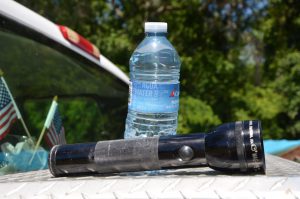
By Samantha Kennedy
UF/IFAS Wakulla County Extension Family and Consumer Sciences Agent
Hurricane season officially begins June 1 which means it is time to evaluate and replenish emergency supplies. A well-stocked emergency kit will make storm response easier during an evacuation or home confinement.
The three most important things to stock a kit with are water, food, and basic household items. Pack all items in a sturdy, waterproof container such as a hard plastic tote or a clean rolling garbage can with a tight-fitting lid for easy transport.
Water. This is the most important item. Hot and humid conditions coupled with a lack of electricity can quickly lead to dehydration. Dehydration can be deadly, so have enough stored clean water for every family member, including pets.
The general rule of thumb is a gallon of water a day per family member, including pets, for at least seven days. For example, a family of four with a dog would need 35 gallons of water on hand (5 people/animals x 1 gallon per person x 7 days) for drinking, cooking/food preparation, and basic personal hygiene.
Commercially bottled water is the safest choice since municipal or well water sources may be contaminated, especially after a storm. Note the expiration or “use by” date on the bottle. This date refers to the shelf life of the bottle itself and not the water inside it. After this date, the plastic may start to degrade, leaching chemicals into the water.
If bottling water at home, use sturdy, food-grade containers. Two-liter plastic soda bottles are ideal, since they are easy to clean and sanitize. Milk bottles or cardboard containers contain residue which may result in bacterial contamination. Never use glass bottles, as these are bulky, heavy, and susceptible to breakage.
Food. The two things to keep in mind here are nonperishable and nutritious. Focus on stocking kits with foods the family will eat.
Nutrient-dense foods, those foods packed with more healthy nutrients per calorie than snack foods, will provide more long-lasting energy during stressful times.
Choose foods requiring little or no cooking since the electricity may be off. If something needs to be refrigerated after opening, either eat the entire product or make sure it is packaged in single-use containers to prevent spoilage.
If foods require additional water to consume, make sure the extra water is added to the overall water supply. Never use water designated for drinking for other purposes.
Babies, elderly, and those with special dietary needs should be considered when packing the kit. Some examples of foods which are good additions to the supply kit include ready-to-eat canned fruits vegetables, meat, juices, milk, and soup. Peanut butter and jelly, crackers, granola and energy bars, trail mix, nuts and dry cereals work well too.
Comfort foods such as cookies, candy, and other treats are fine, but do not make them the focus. Also, cutting down on the salty snacks will help conserve water since salt increases thirst.
Also, include a manual can opener.
Household items. No emergency supply kit is complete without a few important household items. These include sturdy shoes and a set of clean clothes for everyone in the family, rain gear, blankets or sleeping bags, sunglasses, zippered plastic storage bags, pen and paper, cash, utility knife, duct tape, first aid kit, toilet paper and paper towels.
Disposable plates and utensils, sanitary wet-wipes, personal hygiene supplies, medications, garbage bags, battery-powered radio, and flashlights with extra batteries are very convenient for the situation.
It is important to personalize each kit to meet each family’s needs. For more information about building an emergency supply kit, please call the UF/IFAS Wakulla County Extension Service at (850) 926-3931.
 0
0
